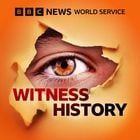In November, 1966, Florence suffered one of the worst floods in its history after heavy rainfall caused the River Arno to burst.
The Italian city was submerged under tons of mud, rubble and sewage, leaving thousands homeless and destroying around 14,000 art treasures, and millions of books and manuscripts.
Among those who came to the rescue were the so-called ‘mud angels’ – young people from around the world who wanted to help in the clean-up.
Antonina Bargellini, then the 22-year-old daughter of the city’s mayor, recalls days of deep mud and stinking streets. She tells Jane Wilkinson about what happened.
Archive from BBC, British Pathe and Associated Press, plus Florence: Days of Destruction, directed by Franco Zeffirelli in 1966.
Eye-witness accounts brought to life by archive. Witness History is for those fascinated by the past. We take you to the events that have shaped our world through the eyes of the people who were there.
For nine minutes every day, we take you back in time and all over the world, to examine wars, coups, scientific discoveries, cultural moments and much more.
Recent episodes explore everything from the death of Adolf Hitler, the first spacewalk and the making of the movie Jaws, to celebrity tortoise Lonesome George, the Kobe earthquake and the invention of superglue.
We look at the lives of some of the most famous leaders, artists, scientists and personalities in history, including: Eva Peron – Argentina’s Evita; President Ronald Reagan and his famous ‘tear down this wall’ speech; Thomas Keneally on why he wrote Schindler’s List; and Jacques Derrida, France’s ‘rock star’ philosopher.
You can learn all about fascinating and surprising stories, such as the civil rights swimming protest; the disastrous D-Day rehearsal; and the death of one of the world’s oldest languages.
(Photo: Flooded street in Florence, 1966. Credit: Giorgio Lotti/Mondadori via Getty Image)


